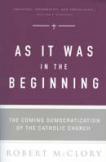In Pursuit of Participation
“There is,” writes Robert McClory, “a democratic dynamic in the church’s self-awareness.” No, dogma is not subject to a vote. Yes, the church must assert its teachings, popular or not. Yes, a certain hierarchical structure is part of the church’s unity. At the same time, the church stays most faithful to its dogma and is most effective in its mission when all its members respectfully listen to one another, breathe together and act together. McClory, a retired journalism professor at Northwestern University and the author of Faithful Dissenters, describes in detail how authoritarianism conversely leads to heresy or scandal or declining membership—or all three at once.
As It Was in the Beginning has three sections: the past (six chapters), the second half of the 20th century through today (six chapters) and the future (one chapter). McClory em-ploys many fascinating examples to support his argument and bolster his hope. Following the Council of Nicaea, for example, many Catholic bishops campaigned against the correct teaching on Jesus’ humanity and divinity. Instead, they told people to accept heretical Arianism. But the laity did not listen, and 56 years later the correct dogma was reiterated at the Council of Constantinople. Cardinal John Henry Newman later wrote about the incident: “The Nicene dogma was maintained during the greater part of the fourth century…not by the unswerving firmness of the Holy See, Councils or bishops, but…by the consensus fidelium.”
The author also describes an early 15th-century council that in asserting “that the ultimate focus of authority resides in the whole body of the church” solved the situation in which there were three undesirable claimants to the papacy. Had Catholics responsibly hung onto the council’s principle of conciliarism for another 100 years, McClory speculates, the Protestant Refor-mation might not have been necessary.
McClory provides several examples of “reform from above.” He highlights the openness of Bishop John Carroll in the early days of the United States, including Carroll’s support for the separation of church and state, the use of English in the sacraments and a lay trustee system to manage parishes. McClory describes the Asian Bishops Conference, an umbrella for national conferences, in its deliberate inclusion of lay people in the implementation of the Second Vatican Council and its dialogue with Asian cultures, even around the sensitive topic of Jesus Christ as the only savior. McClory cites Pope John Paul II’s 1995 encyclical That All May Be One, which opens the door to a more collegial way of understanding the papacy in order to remove ecumenical roadblocks.
Our U.S. bishops’ scandalous mismanagement of personnel has cost our dioceses $1.073 billion in settlements alone over the past four years. Is it that some bishops lost sight of Jesus, that they failed as the Lord’s stewards? Or is it possible that some bishops did something even worse? Is it possible that some bishops in their authoritarianism abetted child abuse?
McClory includes Fyodor Dostoyevsky’s story of the Grand Inquisitor as a motif in As It Was in the Beginning. The Inquisitor did not forget Jesus’ teachings. He knew Jesus very well. However, the paternalistic Inquisitor deliberately asserted his own authoritarian approach over Jesus’ way of grace and sin.
Without drawing an explicit comparison, McClory reports on the prepared remarks of a prominent, moderate United States bishop several months after the current scandal attained worldwide attention. We must be cautious about accountability in the church, the bishop said. “We do not vote or take a headcount to determine what we should believe or how the church should be structured.”
Some fair-minded Catholics are tempted to cynicism or despair upon hearing what they perceive to be an arrogant comment. McClory urges patience and hope. Similar situations in the past have been tempered and even overcome. Openness and reform are part of the essence of the church, gifts of the Holy Spirit. Even in this dark time, “the courage, skill, and persistence of those laymen and laywomen who are sensitive to the signs of the times” can restore credibility to our church.
This article also appeared in print, under the headline “In Pursuit of Participation,” in the April 21, 2008, issue.








